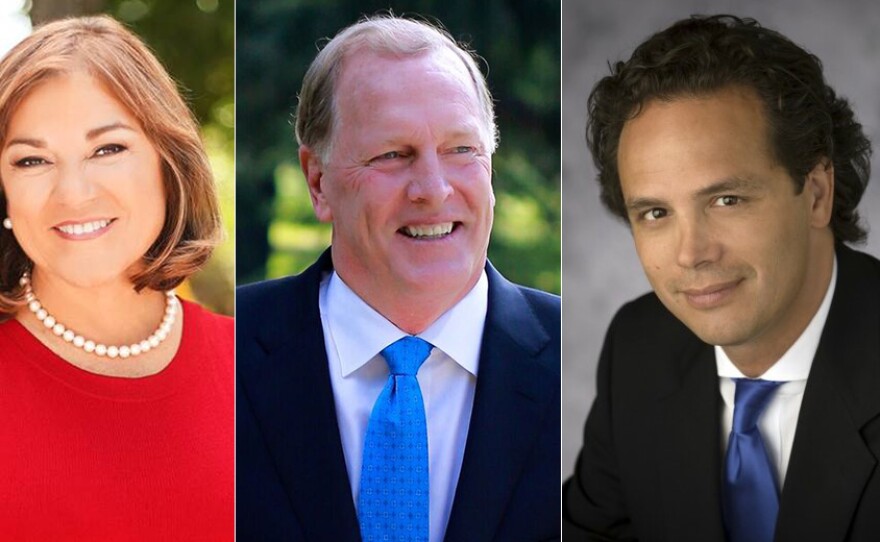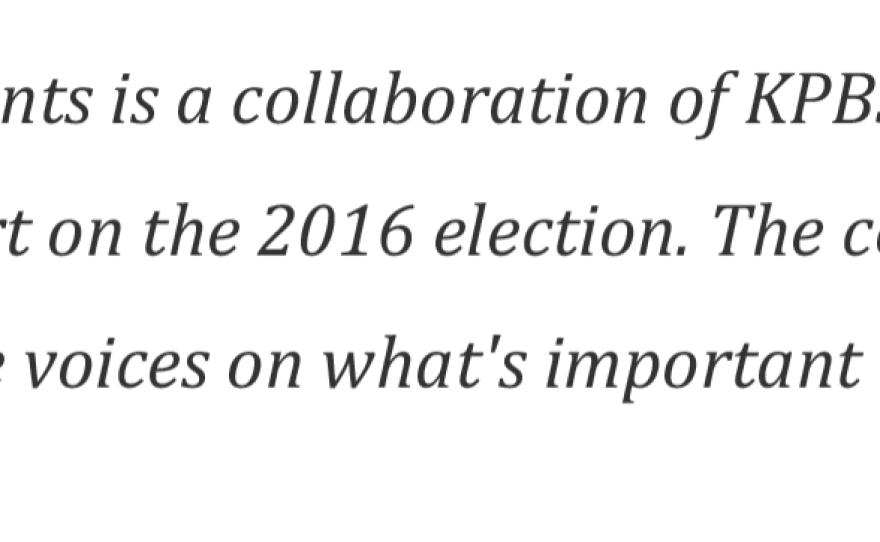Our top story in midday edition. Republicans and Democrats share the same debate stage last night it is a rare event to see candidates of opposing parties debating together. There were some lively exchanges. Including this moment. There are people on that committee that set she has never shown up there. I need to have people that not of Now you're out of time. I would like to respond to that because I am the number two Democrat on the committee. The other candidates in that debate were Kamala Harris, a Democrat. And Republican Tom Del Beccaro . Joining me is Katie or politics and government reporter for KQED. Katie Wickham to the program. Thanks for having me, Maureen. Wyomissing Democrat's and Republicans on stage for the same debate. Is because of the primary system that California has now. Where the top two system. Which means the top two vote getters in the primary proceed to the general election regardless of their political party. For instance as it stands now I Turnage General Harrison Congresswoman Sanchez have been leading one and two in the polls. And if that stands they would go to forward to November even though they are both Democrats. It doesn't make sense to dim separate the parties because your party does not factor into the primary. As you just told us, Kamala Harris is in the lead. For the Senate race. Some pundits say all she needed to do last night was Stambaugh's the freight. Did she manage to do that? I think she did. It was a pretty civilized debate. It was a test your exchange. Some of the Republicans did criticize Harris for different policy she has taken on crime. But for the most part it was pretty civilized. However Harris at one point did take a dig at Congresswoman Sanchez for remarks that she has made that some have said have been critical of Muslims in America. With your sad to say. We must lead with our values which asked includes working with our allies. So we are not the only ones invested in the outcome there. Domestic play we cannot afford to tolerate the anti-Muslim rhetoric. It is marginalized not the shadow marginalizing our Muslim mothers and sisters. Censures said the comments she was criticized for were taken out of context. Center seems to be a focus for a lot of attacks from Harris and the Republicans. What is the strategy of the Republican attacks against Sanchez? Really it is a race for second place. That is how everyone sees it. Kamala Harris has been far enough ahead in the polls consistently that people assume that she will get one of the two top spots. That leaves one spot open as the Republicans see it for them to try and grab onto. Although Sanchez has led them consistently as well. However this was their attempt to really focus on her and try and take away some support so that they are able to get into the natural that -- November general election. So what about the Republicans? Three of it for Republican voters don't even know these guys. Did they manage to make an impression last night? I think it's hard to say. We don't know how many people were actually watching the debate here which would probably play into it. And it was a crowded stage but there were five people up there. Even with 90 minutes that does not give anyone person a whole lot of time. They did try to distinguish themselves. Ron Unz for example tried to emphasize the need for a higher minimum wage. Though he did say he didn't like the level of the $15 level. The fix is too high. Trend five was emphasizing less government. A smaller role for government. Duf Sundheim said we need to expand the earned income tax credit to help the working poor in the United States. So they all got their policies out there. But whether it was enough to distinguish themselves from Sanchez or from each other, I do not know. They might have a little bit more work to do. And they don't have a lot of money to do it. Was there a highlight in the debate last night as you start Katie? I think it was just -- not so much a highlight but the first chance that a lot of voters got to see these candidates. Even Kamala Harris, she has high name recognition in some of the bigger cities in California. But not so much in some of the other rural areas. Loretta Sanchez, again she might be well known in her area but not to a wider audience. This was sort of an introduction. However, it is kind of late because mail in ballots go out in the beginning of May and we know that increasing number of voters actually vote by mail. So they do have one more shot in San Diego on May 10 the wall be having another debate down there. That will be an opportunity again for them to get their message out but time is running short for all of these candidates. I don't remind our listeners that the PBS will host the next debate here in San Diego. It is on Tuesday, May 10 at 7 PM. You can hear it on K PBS radio or watch it on the PBS TV. It is Tuesday, May 10 at 7 PM. I wanted to thank Katie are politics and government reporter. Thank you Katie it's always great. You're welcome.
The five leading candidates for Barbara Boxer’s U.S. Senate seat mixed it up Monday night in a debate that was at times feisty, funny and civilized but did little to change the fundamental dynamics of the race. The front runner, California Attorney General Kamala Harris, escaped mostly unscathed and gave as good as she got on issues ranging from immigration to what some say is an aversion to political risk.
“Fearless, yes, but not reckless,” Democrat Harris said in response to questions about her cautious style. “I believe what Californians want is not grand gestures and beautiful speeches, but they want people who will lead and be thoughtful when they make decisions that impact so many people, mostly voiceless and vulnerable people.”
Republican Tom Del Beccaro also criticized Harris for supporting sanctuary cities while attorney Duf Sundheim hit the attorney general for what he said was a failure to keep guns out of the hands of convicted felons. But Harris kept her cool and mostly brushed aside or ignored those criticisms.
Some of the hottest interchanges were between Rep. Loretta Sanchez, an Orange County Democrat, and the Republicans who need to catch her if they want to make the runoff in November. After Sanchez touted her military bona fides by emphasizing her membership on the House Homeland Security Committee, former state Republican Party Chairman Sundheim criticized her attendance.
“I think it’s great she’s on the committee, but it would be even better if she actually went to the committee hearings,” Sundheim said. “Of 13 of the 18 meetings, she hasn’t gone to the meetings. There are people on that committee who say she never shows up there.”
Sanchez shot back, saying she did attend the hearings, adding that the chair of another committee that met at the same time was out sick so she had to fill in for him. Sanchez also criticized what she called an over-reliance on military solutions.
“Too many of my colleagues go to the toolbox that is called military,” Sanchez said. “‘Oh, the military will take care of that. Oh, the military will take care of that. Let’s just go to war here, oh, let’s just do a no-fly zone, let’s go there.’ And the reality is there are other tools that we have.”

Several times questioners had to stop Sanchez as she hit her time limit, although she mostly ignored the warnings and kept talking. For those who haven’t seen Sanchez in action, Monday night’s debate might have been an eye opener. She has an authenticity many politicians lack in this age of canned speeches and talking points, but while it’s endearing, it can also sound a bit unhinged.
When asked if she’s the kind of political insider voters say they’re tired of, Sanchez said, “I’m not the status quo. Washington hasn’t changed me. I’ve been changing Congress for 20 years.”
Asked about her “shoot from the hip” style, Sanchez said it’s just who she is.
“I come from the people,” she said. “I want to be with the people. I fly home to California every week for 19 years.”
Debate questioner John Diaz of the San Francisco Chronicle noted Sundheim’s support for gay marriage and gun control and asked, “Why are you a Republican?”
Sundheim called himself a “proud Republican,” but said if he wins, “I’m not going back there to work for (Senate Majority Leader) Mitch McConnell or a Republican president.”
But in a state where Republicans are just 28 percent of the electorate, Del Beccaro doubled down on his conservative credentials. The East Bay attorney criticized gun control, hit Harris for supporting Planned Parenthood and used every opportunity to echo Ronald Reagan’s claim that government is the problem, not the solution.
“If we’re going to resolve divisions, we must understand that the source of division most often is government, [it] has become at the center of it,” Del Becarro said. “We can’t always turn to government, and we can’t always ask our neighbor to pay to solve our crisis.”
Silicon Valley entrepreneur Ron Unz is the wild card in the race, as he proved again Monday night. He was the only Republican to support raising the minimum wage.
“I’m very glad that Gov. (Jerry) Brown signed the $15 minimum wage in California, though I think $15 is probably too high,” Unz said. “It’s better than the $10 we had, but I would have supported $13 or $14.”

The debate was sponsored by the San Francisco Chronicle, Sacramento’s KCRA-TV and Stockton’s University of the Pacific. The five candidates are running to replace retiring U.S. Sen. Barbara Boxer, a Democrat. The top two vote-getters in the June 7 primary, regardless of party affiliation, will go on to the November general election.
The faceoff comes at a time when all the candidates are struggling for exposure, mostly losing out to media focused on the presidential election. Although the primary is just six weeks way, the most recent Field Poll found 48 percent of voters were undecided in the U.S. Senate race, meaning in part they just aren’t paying close attention. This is especially true among Republicans, with 66 percent undecided compared with 32 percent of Democrats.
By comparison, the Field Poll in early May 1992, the last time California had a U.S. Senate election without an incumbent, just 15 percent of Democrats and 24 percent of Republican voters were undecided.
The only other debate with all these candidates is scheduled for May 10 in San Diego, a forum co-sponsored by KQED, KPBS (San Diego), KPCC (Los Angeles) and Capital Public Radio (Sacramento).







